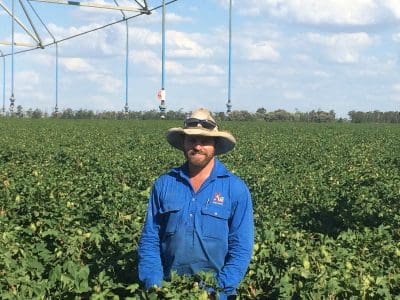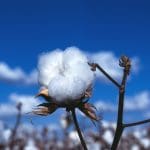THE development of an extensive centre pivot irrigation system utilising recycled water from the coal seam gas (CSG) industry, and the trimming down of the enterprise mix to a focus on cotton, have transformed a family farming business on Queensland’s western Darling Downs.

Darling Downs Cotton Grower of the Year, Ross Uebergang, with one of the centre-pivots that underpins the irrigation enterprise on “Tinobah”, Miles.
The changes have streamlined the operation and earned Ross and Ingrid Uebergang, and Mr Uebergang’s parents, David and Margot, this year’s Darling Downs Cotton Growers of the Year title.
Cotton has become king on their farm, “Tinobah”, near Miles where they now have 400 hectares of irrigation country under centre pivots.
While initially growing cotton from the waters of the Condamine River, the Uebergangs took advantage of the arrival of the CSG industry in the region in 2011 to tap into the recycled water resource that was made available by the gas companies as a by-product of their industry.
“QCG started releasing recycled water into the Chinchilla weir scheme which we used for irrigation here. Then Origin came along and did the same thing, but on a much smaller scale in the local area,” he said.
“Water efficiency is driving everything because I know when the day comes the CSG water runs out I will need all the water I have.”
Ross Uebergang
“We didn’t really put in any more irrigation, it just shored up our supplies for the current scheme. We always had irrigation off the Condamine which is our primary water source. We did develop some irrigation on another farm purely for the use of CSG water.”
Mr Uebergang said the recycled water was good quality and they had grown some of their best cotton on it with no side-effects.
However, while the CSG water has been a windfall for the Uebergangs, they recognise it will only be available for the finite time the mining industry will be operating, so they are planning for a future without it.
“I believe it will have a lifetime. I think it will be a short-term thing. In the meantime, we are trying to make our water system more efficient,” Mr Uebergang said.
“Water efficiency is driving everything because I know when the day comes the CSG water runs out I will need all the water I have. That is our primary focus at the moment while we can afford to do it.”
Enterprise restructuring
The other key plank in the Uebergangs’ success has been the restructuring of the farm’s enterprise mix.
“We decided to change our business model. We were growing a lot of crops like cotton, mungbeans, sorghum, wheat and barley. Cotton was still the main crop but we weren’t focussing on it enough,” Mr Uebergang said.
“Under irrigation I still believe it is the best returner. I don’t think you ever make the money out of grains the way you do out of cotton.
“So, we put all our resources into growing high yielding cotton and have a system in place now where cotton is the pillar and everything else works around it. All the crops we grow in rotation basically aid cotton.”
Grain Central: Get our free daily cropping news straight to your inbox – Click here
Mr Uebergang said the main aim of the business restructure was to simplify their operation as much as possible.
“We found we were going crazy growing four different crops in the one season. We were always tied up doing other jobs so our timeliness wasn’t as good as it should have been,” he said.
“So, we consolidated it all into one and now just try to do two single crops – wheat and cotton.
“If we grow another crop there has to be a big enough area of it to warrant having two crops going at once.
“Opportunity cropping has gone out the window for us. We would rather wait until next season rather than jam something in.”
Cotton-growing tradition
The focus on cotton carries on a tradition of cotton growing that goes back a long way in the Uebergang family.
Mr Uebergang’s grandfather purchased the land at Miles in 1949 when he relocated from Wagga Wagga in southern NSW with his brother. They split the partnership in the late 1960s.
It was in the late 1960s that they grew the first crop of cotton, but it wasn’t a success.
“It was grown on the river under the preliminary irrigation schemes on the Condamine River. It was a sandy soil and it didn’t do very well,” Mr Uebergang said.
When his grandfather’s brother was killed in 1978, the farm was bought back by his uncle and father.
His father, David, went out on his own in 1991, the year the family returned to growing cotton on “Tinobah”.
“It has been a staple ever since. We started off with one centre pivot in the first year, then in 1993 we started developing some storages and flood irrigation on the Condamine. From there it ticked along,” Mr Uebergang said.
Tough year
This year’s cotton crop on “Tinobah” has had a tough season with only 60 millimetres of in-crop rain, heavy insect pressure and a stretch of crippling heatwaves.
“We have been watering solidly since mid-November. We have run out of water and will be one or two waterings short on some fields,” Mr Uebergang said.
 “We had it hard early with mirid sucking pests. We thought we would be a couple of weeks behind but the crop has caught up rapidly.
“We had it hard early with mirid sucking pests. We thought we would be a couple of weeks behind but the crop has caught up rapidly.
“The relentless heat has sent evaporation through the roof and it’s a miracle the crop looks as good as it does.”
The Uebergangs will start picking their small area of dryland cotton in mid-March and move on to the main irrigated crop in early April.
Mr Uebergang said despite the introduction this season of the new, genetically-modified, insect-resistant, Bollgard III cotton with its wider planting window, they still planted their crop at the usual time from October 12.
“We had the most perfect planting conditions and all the dryland went in at the same time as well,” he said.
“In a perfect world, we should have staggered a couple of crops. It had perfect germination and looked like it would be a cracker early on, but the dryland hasn’t had any rain since and it looks terrible with the heat we have had.”
………………
The Darling Downs Cotton Grower of the Year field day will be held at “Tinobah”, Miles, on Wednesday, March 1, 2017.
Contact: Cotton Australia regional manager, Mary O’Brien, [email protected] or 0408 982 291.

HAVE YOUR SAY